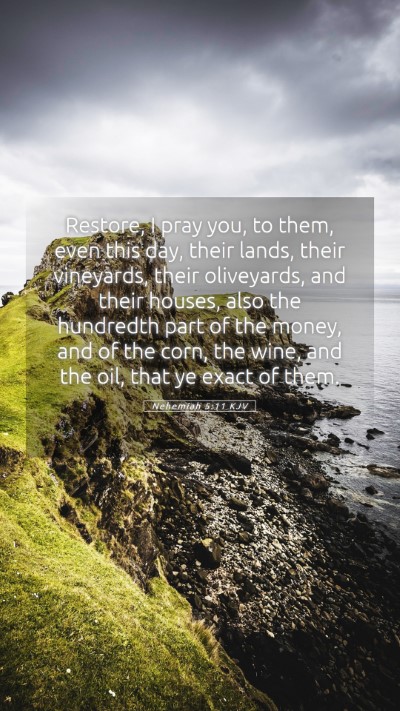Old Testament
Genesis Exodus Leviticus Numbers Deuteronomy Joshua Judges Ruth 1 Samuel 2 Samuel 1 Kings 2 Kings 1 Chronicles 2 Chronicles Ezra Nehemiah Esther Job Psalms Proverbs Ecclesiastes Song of Solomon Isaiah Jeremiah Lamentations Ezekiel Daniel Hosea Joel Amos Obadiah Jonah Micah Nahum Habakkuk Zephaniah Haggai Zechariah MalachiNehemiah 5:11 Meaning
What is the meaning of Nehemiah 5:11?
Restore, I pray you, to them, even this day, their lands, their vineyards, their oliveyards, and their houses, also the hundredth part of the money, and of the corn, the wine, and the oil, that ye exact of them.
Nehemiah 5:11 Bible Verse Meaning
Understanding Nehemiah 5:11 - A Bible Verse Commentary
Nehemiah 5:11 states:
"Restore, I pray you, to them, even this day, their lands, their vineyards, their olive yards, and their houses, also the hundredth part of the money, and of the corn, the wine, and the oil, that ye exacted of them."
This verse is pivotal in understanding the context of social justice and community responsibility as portrayed in the book of Nehemiah. Below are insights derived from renowned public domain commentaries, helping to elucidate its meaning, significance, and applications.
Contextual Background
The historical backdrop of Nehemiah is crucial for grasping its teachings. After the Babylonian exile, the Jews returned to Jerusalem to rebuild their city. However, they faced economic oppression from wealthier Jews who were exploiting their less fortunate brethren. This context of hardship sets the stage for Nehemiah’s passionate plea for justice.
Verse Analysis
In this verse, Nehemiah directly addresses the issue of injustice occurring within the community. Matthew Henry notes that the rich were demanding repayment of debts in the form of land and property, leaving the poor destitute. Nehemiah’s call for restoration emphasizes the need for fairness and the moral obligation of those in power to act justly.
Commentary Insights
- Matthew Henry: He emphasizes the moral duty of the affluent to return not only the land but also shared agricultural products taken from the poorer individuals. This restores not just possessions but also dignity and support for community rebuilding.
- Albert Barnes: Barnes points out that this plea serves as a reminder that social equity is a divine command. The economic hardships faced by the people called for a radical response from their leaders, particularly Nehemiah, who acted as a reformer.
- Adam Clarke: Clarke reflects on the significance of restoration as a biblical principle, suggesting that godly leadership involves remedial actions to rectify wrongs experienced by the vulnerable.
Implications for Today
The message of Nehemiah 5:11 is timeless and challenges modern readers to consider social justice within their contexts.
Nehemiah's actions provide Bible study insights into how communities can fulfill scriptural mandates on justice.
Application in Modern Life
Today, this verse encourages believers to advocate for fairness within their communities. The restoration Nehemiah speaks of can be applied in various forms, such as:
- Engaging in charity and support for the underprivileged.
- Advocating for policy changes that promote economic fairness.
- Supporting community initiatives that restore dignity to those in need.
Related Bible Cross References
- Leviticus 25:39-41: Addresses the concept of redemption and treatment of fellow Israelites in economic distress.
- Proverbs 14:31: Highlights the importance of treating the poor with dignity, aligning with Nehemiah's advocacy.
- Isaiah 58:6-7: Discusses true fasting that entails breaking chains of injustice and sharing with the needy, echoing Nehemiah's call for restoration.
Conclusion
In summary, Nehemiah 5:11 serves as a compelling call to action for justice and restoration within our communities. By analyzing this verse through the lenses of historical context and scholarly insights, we garner Bible verse understanding that resonates with the ongoing challenges of today's society.
As we engage in our own Bible study groups or online Bible study sessions, let us reflect on what it means to restore and uplift those who are disadvantaged, following the example set forth by Nehemiah.


